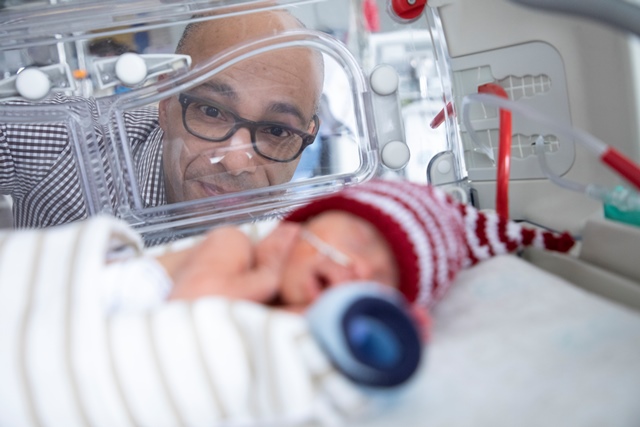
By Season Osborne
Little Olivia Eberts had oxygen tubes in her nose until after her first birthday. Because she was born prematurely, her tiny lungs were underdeveloped and she couldn’t breathe without oxygen. Ironically for Olivia, and many premature babies like her, the oxygen that saved her life also damaged her lungs, causing bronchopulmonary dysplasia (BPD), which is like starting out life with emphysema. This meant she needed to stay on oxygen even longer to help her breathe.
“She was on supplemental oxygen for so long, it was almost part of her identity,” said Jamie Eberts, Olivia’s mother.
Olivia was born on January 29, 2017, at 23-and-a-half weeks gestation, or 17 weeks too early. She weighed one pound, two ounces. Her twin brother Liam weighed only a few ounces more than she did. Both babies required oxygen and mechanical ventilation to keep them alive, and as a result, both developed BPD—the most common cause of death in premature babies. Sadly, baby Liam passed away a few weeks after he was born while Olivia remained in the Neonatal Intensive Care Unit (NICU) at The Ottawa Hospital for seven months.
In Canada, 1,000 babies suffer from BPD every year. Often babies with BPD, develop other chronic lung diseases, such as asthma, and many require prolonged oxygen and ventilation. They also have a high incidence of hospital readmissions in the first two years of life. Babies with BPD often have problems in other organs as well, such as the brain or the eyes.

“Even now, a simple flu that put me in bed for a couple of days, put her in hospital and turned into pneumonia,” said Jamie. “It’s scary.”
The doctor told Jamie that with Olivia’s respiratory issues, there would be no guarantee that Olivia will ever leave the hospital entirely.
“Currently there is no treatment for this disease,” said Dr. Bernard Thébaud, a neonatologist and senior scientist at The Ottawa Hospital.
He hopes to change the outcome for babies, like Olivia, who have BPD.
“In the laboratory, we discovered that a particular type of stem cell can prevent BPD or regenerate newborn lungs,” says Dr. Thébaud, who is also appointed at CHEO and the University of Ottawa. “Our research uses stem cells, isolated from the umbilical cords of healthy newborns, to prevent the lung injury or even to some degree regenerate a damaged lung in the laboratory. We foresee that these stem cells, given during a certain time during the hospital stay of these babies, could prevent the progression of the lung disease.”
Dr. Thébaud and his research team are preparing for an early phase clinical trial to test the feasibility and safety of the stem cell treatment on premature babies.
“Stem cell research is incredibly innovative.” said Janet Brintnell, Clinical Manager of the NICU who has seen dozens of premature babies suffer from BPD. “Here, we have a very promising, emerging therapy that could prevent lung injury but also improve brain development and eye sight. It’s amazing when you think of what it may be able to do for the quality of life for the child, for their family and for our health-care system. It could reduce length of stay, hospital admissions, and reduce long-term outcomes. It could help these little ones lead healthier lives.”
“We are the only ones doing this kind of stem cell research in Canada, and there are only a few other teams in the world that are doing this,” said Dr. Thébaud.
Two years ago, when Olivia was in the NICU, Jamie and her husband Tim met Dr. Thébaud and wished his stem cell treatment could have been available to help heal their babies.
“What’s hard is we think, ‘But if we could’ve signed up for the trial? Would Liam be alive? Would Olivia be suffering?” said Jamie. “Even to this day, if we are asked to put Olivia in the trial as an older candidate, we will.”
Olivia is now a happy, active toddler who loves copying her older brother Jacob. Although, she still has BPD, it is increasingly manageable, and she no longer requires supplemental oxygen. Olivia may suffer respiratory illness her entire life, but one day, a stem cell treatment developed in Ottawa could mean that the next generation of babies with BPD won’t.
Season Osborne is the Publications Officer at The Ottawa Hospital.


